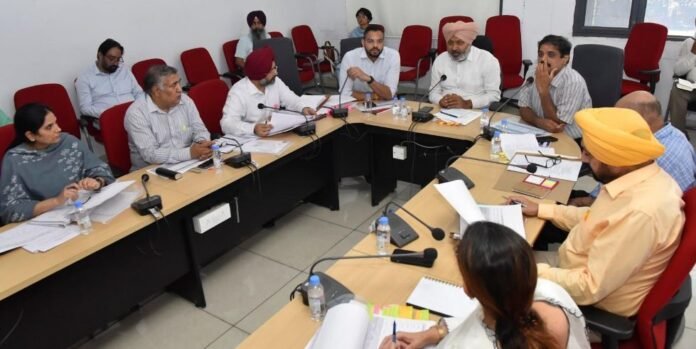In a significant milestone reflecting the strengthening fiscal health of Punjab, the Patiala GST division has emerged as the frontrunner in Goods and Services Tax (GST) growth during the first quarter of the 2025–26 financial year. Patiala registered an exceptional 40 percent growth rate, setting a new benchmark across the state. Simultaneously, Ludhiana division maintained its reputation as the state’s economic powerhouse by contributing the highest gross GST collection of ₹1998.76 crore during the same period. These developments were reviewed during a high-level quarterly performance meeting of the Excise and Taxation Department, chaired by Finance, Planning, Excise and Taxation Minister, Advocate Harpal Singh Cheema.
The minister lauded the exceptional performance of the top-performing divisions, namely Patiala, Ropar, and Amritsar, all of which posted remarkable growth figures. Ropar followed Patiala with an impressive 34.97 percent growth, collecting ₹1315.66 crore, while Amritsar division recorded a 30.26 percent growth, totaling ₹687.19 crore in revenue. Patiala, although not the highest in terms of absolute collections, saw its revenue jump from ₹484.98 crore in Q1 of FY 2024–25 to ₹679 crore this year. This substantial increase marked a strong resurgence in tax collection from a division traditionally not at the top of the list.
However, it was Ludhiana that once again led the overall revenue chart. The division notched a remarkable 23.89 percent year-on-year increase, up from ₹1613 crore last fiscal to ₹1998.76 crore in Q1 of FY 2025–26. These numbers not only underline Ludhiana’s consistent contribution to the state’s economy but also highlight the impact of sustained administrative measures to plug leakages and enforce compliance.
Finance Minister Harpal Singh Cheema, while reviewing the quarterly performance, engaged in an in-depth discussion with the Deputy Commissioners of State Tax (DCST) and divisional in-charges. The dialogue focused on best practices in the divisions that saw substantial growth and the need for underperforming divisions to adopt similar strategies. The emphasis was placed on replicating success through innovation, teamwork, and consistent enforcement.
One of the critical aspects reviewed during the meeting was the management of GST and VAT arrears. The minister directed officials to adopt innovative and aggressive approaches to recover outstanding dues. He specifically highlighted the importance of following up on old arrears, encouraging the use of digital tracking tools and inter-departmental coordination to maximize recovery.
In a parallel effort, Cheema also assessed the state’s enforcement capacity. The performance of the Excise Department and its dedicated enforcement wings was critically examined. A special focus was laid on the State Intelligence and Preventive Unit (SIPU), which has been tasked with curbing tax evasion and unearthing illegal operations that undercut the state’s legitimate revenue streams. Detailed reports from Excise teams showed a robust enforcement drive against the smuggling of liquor and illegal alcohol sales, particularly those sourced from outside Punjab. These operations have significantly curbed bootlegging, ensuring that revenue leakage in the liquor trade is minimized.
The finance minister expressed satisfaction with the enforcement wing’s performance but was quick to urge them to step up efforts further. He underscored the need for more aggressive field action, especially in high-risk border districts, to ensure illicit liquor activities are completely dismantled. He also called for close monitoring of areas previously identified as bootlegging hotspots and instructed officials to initiate preventive raids and surveillance in real time.
In his closing remarks, Cheema turned his attention to pending legal matters. He reviewed the status of both GST and VAT appeal cases, including those instituted in the first quarter of the current fiscal year. The minister stressed the urgency of fast-tracking these appeals, especially those involving individuals or businesses implicated in hooch tragedies and tax evasion. Cheema called for vigorous legal follow-ups to ensure that offenders face appropriate and swift penalties under the law.
Importantly, he also directed the department to identify areas where red tape or administrative delays are hampering speedy resolutions and to implement structural reforms to address these bottlenecks. The goal, he stated, is to build a tax administration that is not only efficient but also transparent, equitable, and responsive to the needs of the citizens.
Also present at the review meeting were senior officials, including Additional Chief Secretary-cum-Financial Commissioner (Excise), Dhirendra Kumar Tiwari, Secretary (Taxation), Ajit Balaji Joshi, and Excise and Taxation Commissioner Jitendra Jorwal. Their presence and active participation indicated the government’s seriousness about ensuring revenue efficiency and strengthening tax governance mechanisms.
The quarterly performance review concluded with renewed commitments to widen the tax base, enhance taxpayer education, and modernize enforcement strategies through digital tools and inter-agency collaboration. With record-breaking growth in multiple divisions and the government’s clear emphasis on performance-driven governance, Punjab’s excise and taxation framework is poised for even greater transparency and efficacy in the quarters to come.
This is a web generated news report.





